| | | OFFLINE | | Post: 28.376
Post: 10.780 | Registrato il: 28/08/2005
Registrato il: 20/01/2009 | Administratore | Utente Gold | |
|



ALWAYS AND EVER OUR MOST BELOVED BENEDICTUS XVI



I am re-posting this here, since I was unable to promptly post them when I said I would (although I have posted it on the previous page in the slot I had reserved for it). But more than 24 hours and a number of newer posts have elapsed since then. So best to re-post them here.
These are lookbacks to what Benedict XVI said when he was Pope about the problem of remarried divorcees who want to receive Communion. They are necessary references to my post on Riccardo Riccardo Cascioli's denunciation of the synchronous events late last week in the German and Italian media that purported to show that Benedict XVI - as a theology professor and later as Pope - actually expressed himself open to allowing communion for remarried divorcees as the Pope and his chief associates have been promoting.
I have not so far found a copy online, in any of the languages I can read, of the 1972 article by Prof. Ratzinger, which he rewrote specifically and appended to Volume 4 of the COLLECTED WRITINGS OF JOSEPH RATZINGER, the latest of the 16-part opera omnia[/c} which has been published in Germany.
Meanwhile, here is what Pope Benedict said on the two occasions cited by Vaticanista Ignazio Ingrao in a new book on the recent family synod, to 'show' that Benedict XVI was on the Bergoglio-Kasper side of the current debate, even if a reading of what Benedict XVI actually said does not support that preposterous claim at all! (I ought to check what Ingrao actually quoted of these passages.)
 On the efforts to enlist Benedict XVI
On the efforts to enlist Benedict XVI
in the Bergoglio-Kasper proposal to relax
Church discipline on remarried divorcees
Because Benedict XVI is retired and does not have a Press Office or a spokesman to ward off those who would find some pretext to disturb his peace, he has been open game for the media and other parties interested in using him for their own ends.
In the post to which this is an appendix, Riccardo Cascioli recounts how Vaticanista Ignazio Ingrao, in a new book, and Andrea Tornielli, in his review of Ingrao's book, concur that Benedict XVI was as open to conceding communion to remarried divorcees as Cardinal Kasper and his supreme patron, Pope Francis, are. And that therefore, Cardinal Burke and all those bishops who opposed the Bergoglio-Kasper leniency on sacramental discipline ought to reconsider their opposition "because even Benedict XVI is is not on their side".
Here are the two interventions made by Benedict XVI on the subject, which Ingrao cites as 'proof' of his unfounded hypothesis. Benedict clearly says he would not 'dare' propose an answer, but on both occasions, seven years apart, he underscores the idea that remarried divorcees who suffer because they cannot receive communion must learn to accept that suffering is part of life, and they can offer their suffering to the Church as their participation in the Cross of Christ -- as does everyone else who suffers for a variety of other reasons.. That they are not excluded from the Church because of this and should seek to be in permanent contact with s priest or spiritual director.
Benedict XVI: Meeting with
the diocesan clergy of Aosta
Introd, July 15, 2005
...A priest raised the question of communion for Catholics who had divorced and then remarried. This was the Holy Father's reply:
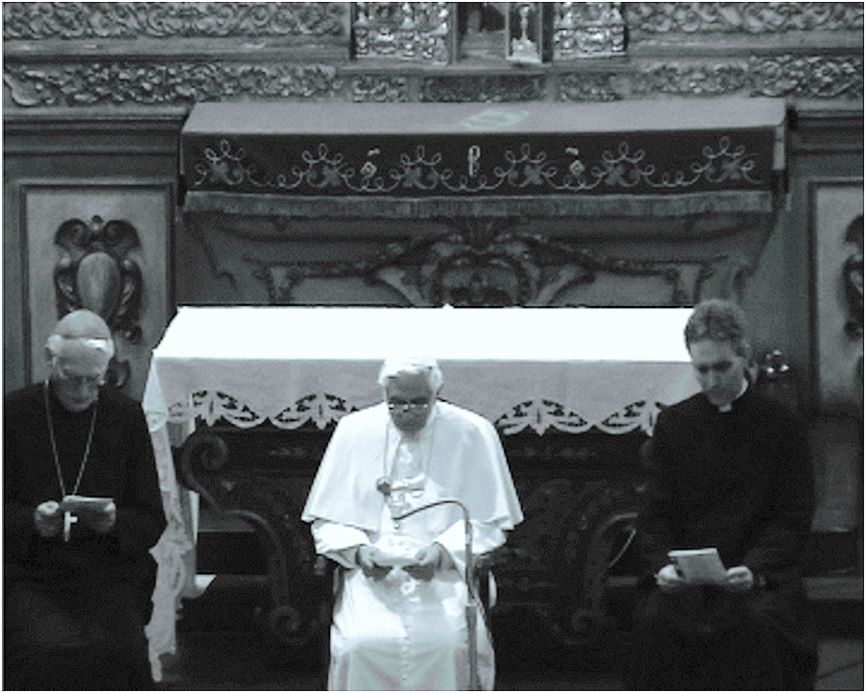 We all know that this is a particularly painful problem for those who live in situations where they are excluded from Eucharistic Communion, and of course, for the priests who wish to help these persons to love the Church, to love Christ. It poses a problem.
We all know that this is a particularly painful problem for those who live in situations where they are excluded from Eucharistic Communion, and of course, for the priests who wish to help these persons to love the Church, to love Christ. It poses a problem.
None of us has a ready-made prescription, if only because the situations are always quite diverse. I would say that the situation is particularly painful for those who were married in church, but wre not truly believers and simply did so out of tradition. Then, they find themselves in a new marriage that is not valid in the Church but they have converted, find the faith and feel excluded from the Sacrament. This can really be a great suffering, and when I was Prefect of the Congregation for the Doctrine of the Faith, I oinvited various episcopal conferences and experts to study the problem of a sacrament that was celebrated without faith.
Whether a case could really be made for the invalidity of such a marriage, because a fundamental dimension for the sacrament was lacking, I cannot dare say. Personally, I thought there might be, but in the discussions that we had, I came to understand that the problem is very difficult, and that it still had to be studied in depth. But given the suffering of those in such a situation, such a study should be made.
Therefore I would not dare give an answer. In any case, I think two aspects are very important.
The first: Even if such couples cannot receive sacramental communion, they are not excluded from the love of the Church and from the love of Christ. A Eucharist without sacramental communion is certainly incomplete, it lacks an essential part.
But it is also true that to take part in the Eucharistic sacrifice without communion does not mean nothing at all. It always means being involved in the mystery of the Cross and of the resurrection of Christ. It is always a participation in the Sacrament in its spiritual and pneumatic [pertaining to the Holy Spirit] dimension, but also in the ecclesial dimension, even if not strictly sacramental.
Since the Mass is the Sacrament of the Passi0n of Christ, then the suffering Christ embraces these persons in a special way and communicates with them in a different way, so therefore, they can feel that they are being embraced by our suffering Lord, he who falls down and suffered and died for them, with them.
Therefore, it is important to make these couples understand that even if, unfortunately, they cannot avail of a fundamental dimension of the sacrament, they are not at all excluded from the great mystery of the Eucharist, and from the love of Christ who is present in the Eucharist.
I think this is very important. Just as it is important for the parish priest and the parish community to make them understand that on the one hand, we must respect the indissolubility of the Sacrament of marriage, but there are persons who suffer because they cnanot receive communion. And we must suffer with them, because they also bear witness to something important, because we know that from the momen that they yielded for love, they also violated the sacrament of marriage, thereby weakening the idea of its indissolubility.
We know this problem not only from the Protestant communities but also in the Orthodox Churches who are often presented as a model for the possibility of a second marriage. But even for them, only the first marriage is sacramental - the second marriage is matrimony in a reduced sense, re-dimensioned as a penitential situation. In a way, they may go to communion but this is conceded in oikonomia, as they say, out of mercy which nonetheless does not alter the fact that the second marriage is not sacramental.
The other point for the oriental churches is that for these marriages, the possibility of divorce has been conceded very easily, and that therefore the principle of indissolubility, which is the true sacramentality in matrimony, is severely wounded.
On the one hand, therefore, we must consider the good of the community and the good of the sacrament that we must respect, and on the other hand, the suffering of those persons whom we have a duty to help.
The second point that we must teach and that we must make credible by living it in our own lives is that suffering, in various forms, is necessarily part of life. I would call it a noble suffering. Once again, we must make the faithful understand that pleasure is not everything. That Christianity does give us joy, as love gives us joy.
But love is also always renouncing oneself. The Lord himself gave us the formulation of what love is: whoever loses himself, finds himself, and whoever gains or keeps himself, loses himself.
Love is always an exodus, and therefore, also suffering.
True joy is something distinct from pleasure. Joy grows, and always matures when we suffer in communion with the Cross of Christ. Only from this arises the joy of faith, from which persons in their situation are not excluded, provided they learn to accept their suffering in communion with that of Christ.
So how could Ingrao and Tornielli read into that little treatise on suffering that Benedict XVI favored pastoral leniency for [unqualified] remarried divorcees? He was plainly saying to them: "You know you sinned against the sacrament of marriage. That is why you are suffering exclusion from communion. Suffering is part of lfie. This happens to be your particular suffering. Others have their own. Accept your suffering in the spirit of suffering with Christ, and you will experience the joy of faith".
He's not giving anyone an easy pass. The Way of the Cross is not easy, and each of us must take it. No exemptions from this, as there are no exemptions from sin, and no exclusions from the joy of the faith.
Seven years later, in Milan, he was asked the same question but this time by a couple of psychotherapists from Brazil. His answer was the same: The plight of remarried divorcees who are unable to receive communion is a suffering "in the name of the great values of the faith" (the indissolubility of marriage and the sacramental inviolability of the Eucharist), a suffering to be considered as a gift to the Church. Nowhere does he indicate in any way that he thinks they should have an easy pass. "This is your suffering. You have brought it upon yourself. Now accept it, and suffer in good faith, as everyone else must bear their kind of suffering".
BENEDICT XVI: World Meeting of Families
Milan, June 1, 2012
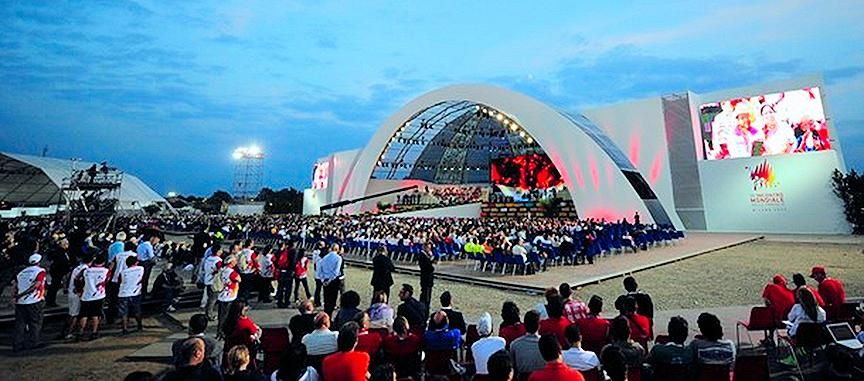
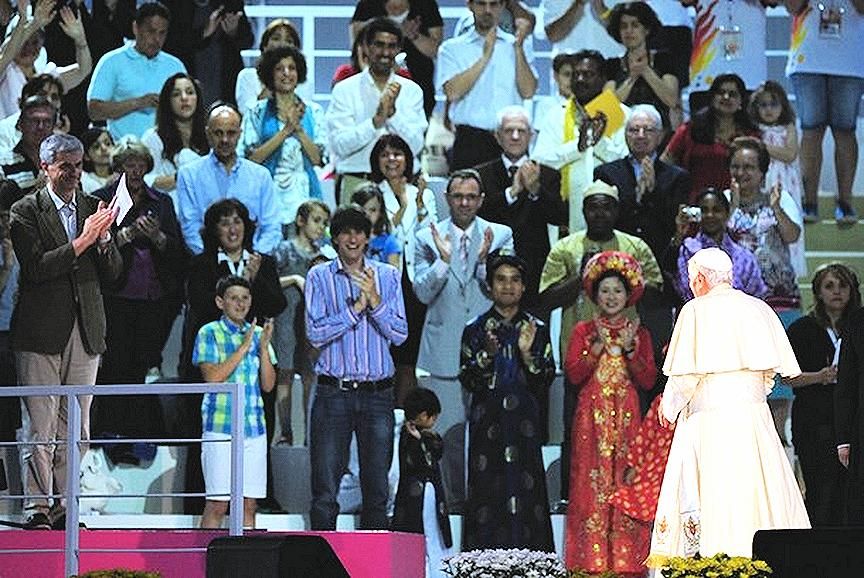
The fifth question directed to the Holy Father by represetnatives attending the meeting came from the Araujos of Porto Alegre, Brazil:
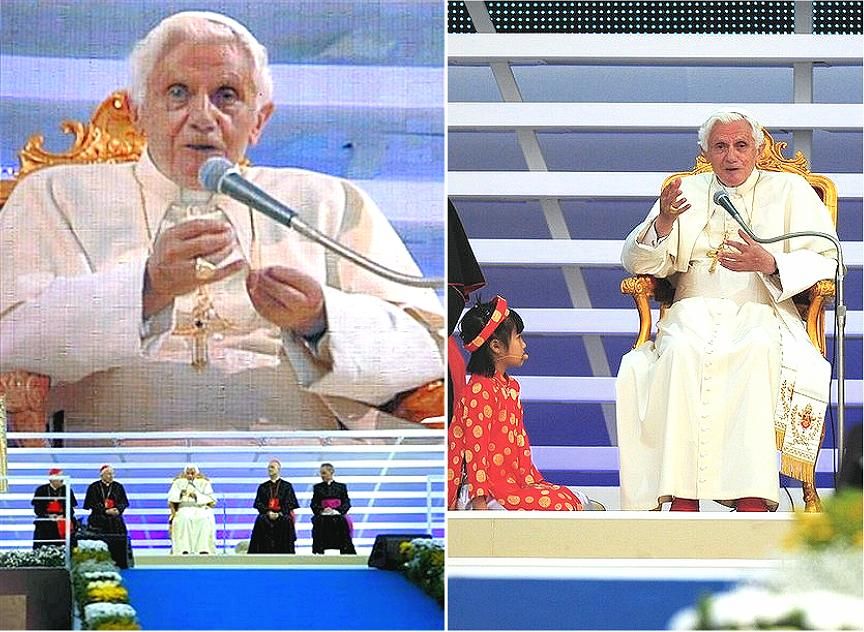 MARIA MARTA: Holiness, as in the rest of the world, marital failures continue to grow in Brazil. I am Maria Marta, he is Manoel Angelo. We have been married for 34 years and we are grandparents. As a doctor and familial psychotherapist, we meet so many troubled families, noting in the conflicts between couples an increasingly marked difficulty to forgive and to accept forgiveness. But in other cases, we find the desire and the will to construct a new union, something that will last, for the children who will be born from this new union.
MARIA MARTA: Holiness, as in the rest of the world, marital failures continue to grow in Brazil. I am Maria Marta, he is Manoel Angelo. We have been married for 34 years and we are grandparents. As a doctor and familial psychotherapist, we meet so many troubled families, noting in the conflicts between couples an increasingly marked difficulty to forgive and to accept forgiveness. But in other cases, we find the desire and the will to construct a new union, something that will last, for the children who will be born from this new union.
MANOEL ANGELO: Some of these remarried divorcees wish to be nearer to the Church but their disappointment is great when they are refused the sacraments. They feel excluded, branded with a judgment that is unappealable. These sufferings deeply hurt those who are concerned, and these are also our wounds. Holy Father, we know that these situations and these persons are very much in the heart of the Church - but what words and what signs of hope can we give them?
Dear friends, thank you for the work that you do as family psychotherapists, which is very necessary these days. Thank you for all that you do to help those who suffer as you say.
Indeed, this problem of remarried divorcees is one of the great sufferings for the Church herself. We do not have a simple prescription. The suffering is great, and we can only help through the parishes, so they may help these people to bear the consequences of divorce.
But I would say that it would naturally be very important to begin with prevention, namely, to help couples so that from the time they fall in love, they are able to proceed to a mature and profound decision about marriage. And later on, when they are married, to accompany these couples along the way, so that they do not feel alone or isolated.
As for those you speak about, we must say, as you did, that the Church loves them, but they should be able to see and feel this love. I think it is a great task for the parish, for a Christian community, to do what is possible to make them feel loved and accepted, that they are not cast out because they cannot receive absolution and the Eucharist. They must see that, even so, they still live fully within the Church.
Even if the absolution of confession is not possible, they can still have permanent contact with a priest, with a spiritual guide, which is important so that they can see they are truly being helped along.
And they must feel that the Eucharist is true, that they participate in the Eucharistic sacrifice if they truly enter into communion with Christ. Because even without physically receiving the Sacrament, we can be spiritually united to Christ in his Body [the Church].
To make them understand this is important - so that they may truly find the possibility of living a life of faith, with the Word of God, in the communion of the Church, seeing their suffering as a gift to the Church, serving to help everyone defend the stability of love in marriage; and that this suffering is not just a physical and psychological torment, but a suffering in the community of the Church in the name of the great values of our faith.
I think that their suffering, if accepted interiorly by themselves, is a gift to the Church. And they should know that in their way, they serve the Church, they are in the heart of the Church. Thank you for your commitment.
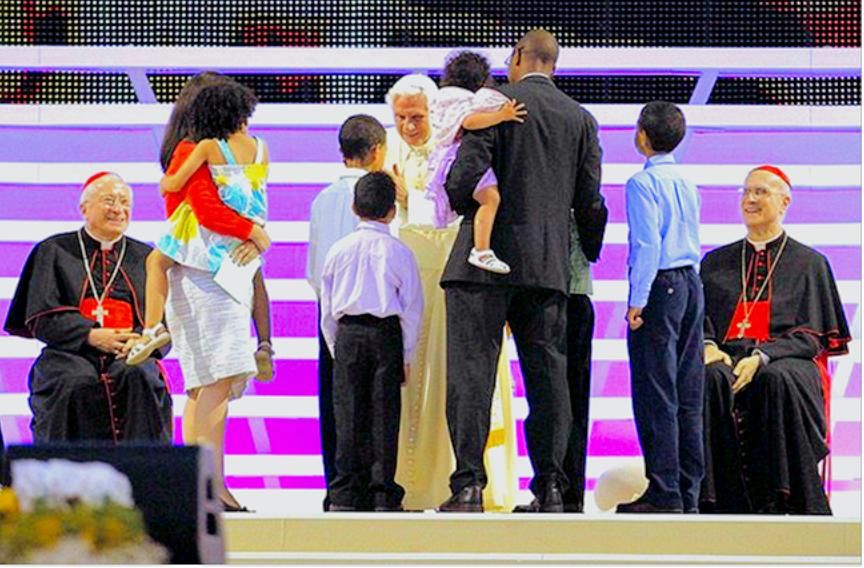
[Modificato da TERESA BENEDETTA 26/11/2014 02:41] |